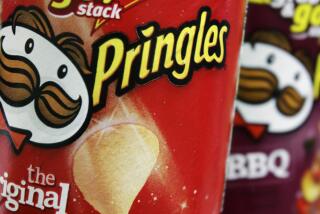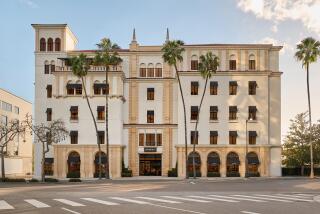Philip Morris Buying Coffee, Candy Giant : Deals: The $3.8-billion acquisition of Switzerland’s Jacobs Suchard will help the cigarette maker compete better against Nestle, the world’s biggest food company.
- Share via
Philip Morris Cos., the international food and tobacco giant, is gobbling up some of Europe’s fine chocolates and coffee.
In a $3.8-billion deal announced Friday, it agreed to buy most of Jacobs Suchard AG of Zurich, the world’s No. 3 coffee and chocolate company.
For the record:
12:00 a.m. Aug. 1, 1990 For the Record
Los Angeles Times Wednesday August 1, 1990 Home Edition Business Part D Page 2 Column 3 Financial Desk 1 inches; 24 words Type of Material: Correction
Cigarettes--A June 23 chart on food industry consolidations erroneously listed Marlboro cigarettes as being owned by RJR Nabisco. Marlboro is a property of Philip Morris.
The acquisition would bring such Philip Morris products as Maxwell House coffee, Miller Beer and Marlboro cigarettes together with Jacobs Suchard’s Tobler and Toblerone chocolates, plus other brands that are hits in Western Europe but little-known in the United States. It also continues New York-based Philip Morris’ string of big food company acquisitions.
For Philip Morris, which bills itself as the world’s largest consumer goods company and the No. 3 food concern, getting into the chocolate business would be particularly sweet. Its lack of chocolates has been a soft spot in its competition with Nestle SA, the world’s biggest food business.
In addition, Jacobs Suchard’s coffees are strong sellers in countries where Maxwell House is weak, such as West Germany, France, Austria and Switzerland. In France, for instance, Jacobs Suchard accounts for 38% of the coffee market, versus just 2% for Philip Morris. Philip Morris has the edge in Britain, Spain and Scandinavia.
Analysts praised the deal, saying Philip Morris would gain strong product lines and a good distribution network at a relatively low price. “It makes them more of a world power in the consumer goods business,” said Robert M. Raiff of C. J. Lawrence in New York.
With strong cash flow from its cigarette business, Philip Morris often is on the prowl for acquisitions. That had spurred concern that it would make an expensive purchase that could hurt its earnings in the short run.
But the Jacobs Suchard deal, analysts said, doesn’t present that problem. “It’s a plus from day one,” Raiff said. “It’s hard to make an acquisition like that.”
On the New York Stock Exchange, Philip Morris’ stock climbed 37.5 cents to $44.75 on a day when the Dow Jones industrial average was off 44.55 points.
The decision to sell Jacobs Suchard reportedly was prompted in part by the debts of Klaus Jacobs, the company’s chairman, chief executive and majority owner. Jacobs, who is in his 60s, put together the company in 1982 by merging the Swiss firm Suchard-Tobler with West Germany’s Jacobs Kaffee. He later added six candy firms and bought out the holdings of other members of his family last year.
Jacobs Suchard’s only U.S. candy business, the slumping E. J. Brach Inc. of Chicago, will be sold back to Jacobs, along with Canadian operations and banking interests.
Under the deal, Philip Morris is buying at a premium a holding company owned by Jacobs that has 60% of Jacobs Suchard’s stock. A tender offer will be made for the remaining Jacobs Suchard shares.
A Philip Morris spokeswoman said the deal is expected to be completed in a month, following regulatory reviews.
Jacobs Suchard will retain its name and continue to be based in Switzerland. Jacobs is giving up his title as chief executive but will stay on as chairman.
The acquisition follows Philip Morris’ purchase of General Foods Corp. in 1985 for $5.7 billion and of Kraft Inc. in 1989 for $13 billion.
Despite its move into foods, Philip Morris’ tobacco business still accounts for 65% of its operating profit and 40% of its operating revenue.
For 1989, Philip Morris reported a profit of $2.9 billion on revenue of $44.8 billion--$8 billion from Europe. It has 157,000 employees worldwide.
Jacobs Suchard last year posted profit of $194.6 million on sales of $4.7 billion. It employs 16,000 in more than 20 countries. The units of the company that will be kept by Philip Morris have annual sales of $3.6 billion to $3.7 billion, estimated analyst John C. Maxwell Jr. of the Wheat, First Butcher & Singer securities firm.
Not everyone was pleased with the deal. The news was a big surprise in Switzerland, which has stiff restrictions against takeovers. In addition, the Zurich Stock Exchange said it was looking into whether it should launch a formal investigation into possible insider trading in Jacobs Suchard stock before the deal was disclosed.
In a news release, Hamish Maxwell, chairman and chief executive of Philip Morris, said: “The businesses of Jacobs Suchard fit our strategic plans for strengthening our European food business. Our companies are strong in different markets and each therefore will complement the other.
“This combination will permit us to more effectively compete throughout Europe with excellent brands and broad distribution and manufacturing capabilities.”
Said Jacobs: “This is a major opportunity for all of the parties--consumers, customers and employees--to build one of the best global coffee and confectionery businesses. We now have the opportunity, with the combination of Jacobs Suchard and Philip Morris, to become the best because of both companies’ excellent product quality, excellent service to our customers and excellent job opportunities for our employees.”
FOOD INDUSTRY’S GROWING CONSOLIDATION 1990
* Philip Morris (Kraft, General Foods, Miller Brewing Co., Seven-Up) acquires Swiss-based Jacobs Suchard AG for $3.8 billion on June 22. Philip Morris had paid $5.6 billion for General Foods in 1985 and $13.1 billion for Kraft in 1988.
* ConAgra (Banquet, Healthy Choice, Armour Classics, Chun King, Morton) purchases Beatrice (Hunt-Wesson, Orville Redenbacher, Peter Pan, Swift Premium, Eckrich, Butterball, La Choy) for $1.34 billion on June 8.
1988
* British conglomerate Grand Metropolitan PLC (world’s largest liquor company and a major owner of restaurants and gaming companies in Britain and Europe) acquires Pillsbury (Pillsbury, Green Giant, Haagen-Daz, Burger King) for $5.7 billion.
1985
* RJR Nabisco was formed by R. J. Reynolds Tobacco’s (Marlboro, Winston, Salem, Camel cigarettes) acquisition of Nabisco (Oreo, Ritz, Planters, Del Monte) for $5.2 billion.
* Carnation was acquired by Swiss-based Nestle for $2.9 billion.
Los Angeles Times
More to Read
Inside the business of entertainment
The Wide Shot brings you news, analysis and insights on everything from streaming wars to production — and what it all means for the future.
You may occasionally receive promotional content from the Los Angeles Times.










